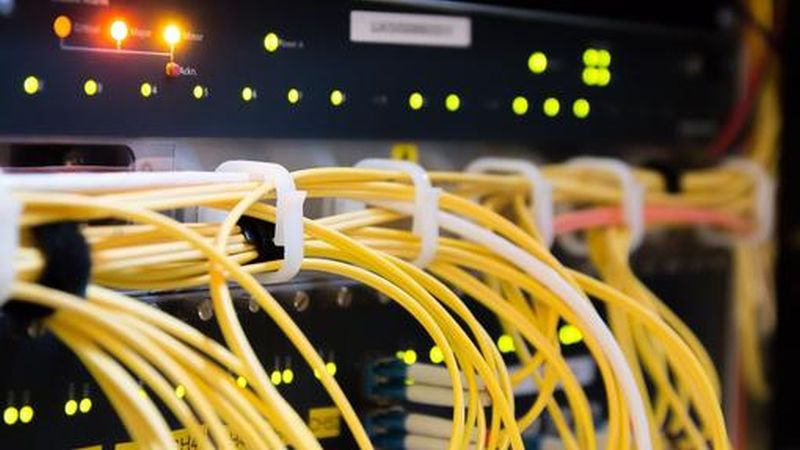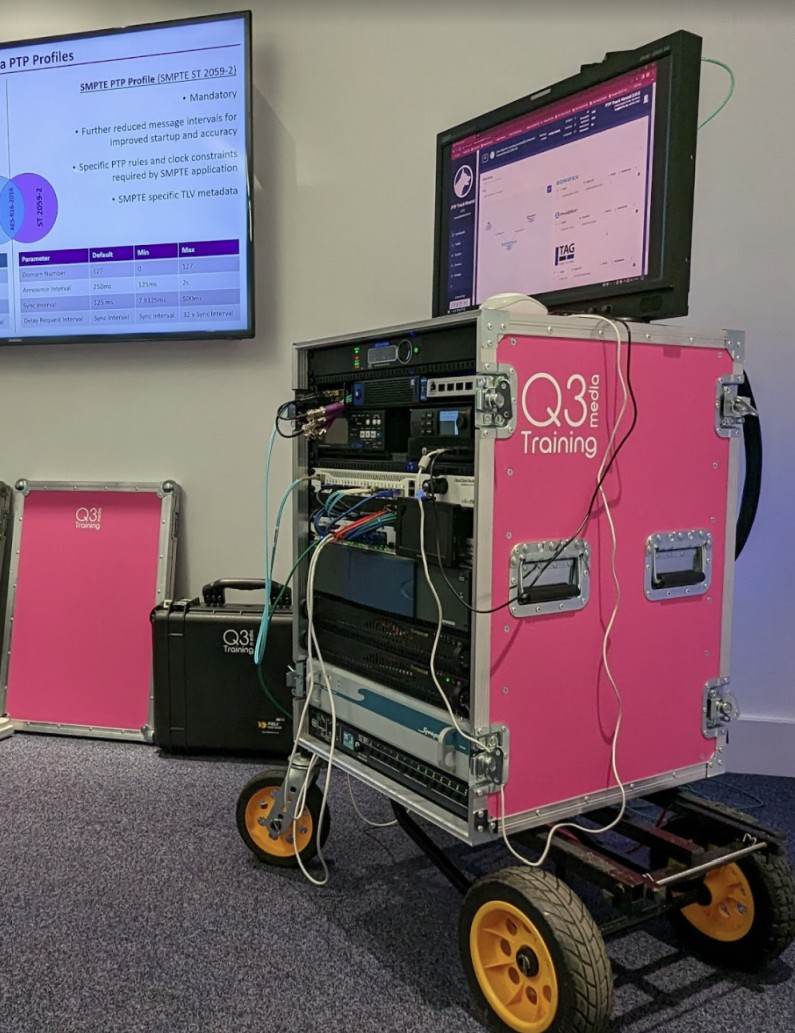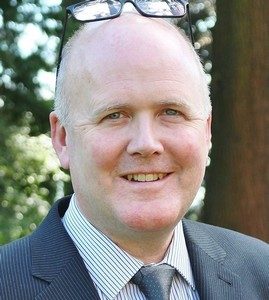Home > Training Courses > IP Media Networks
TR-1001 IP Media Networks
Video Over IP, SMPTE ST 2022, SMPTE ST 2110, PTP, NMOS & more!
3 days

Overview
This training course covers everything you need to know about the video formats and standards used across IP-based networking for Media Production (Broadcast / Television). It covers all the essential network protocols and standards for uncompressed video over IP as well as looking at how to make such systems work through the use of PTP and AMWA’s NMOS specifications (IS-04 / IS-05 etc).

The course is presented over 3 days including some hands-on practical sessions. It can be simplified to cover most of the key topics in 2 days (no hands-on sessions and less depth in some topics).
A range of equipment will be used for demonstration of key functions.
Equipment includes:
- PTP Grandmaster
- SMPTE ST 2110 Senders & Receivers
- SMPTE ST 2022-6 Senders & Receivers
- 25G/10G/1G Network Hardware
- NMOS IS-04 / IS-05 Routing
- Test & Measurement (Phabrix QxL, Meinberg ptpTrackHound v2)
- TAG VS IP Multiviewer
- 32×32 3G-SDI signal routing
- SDI camera, media players & multiviewers
Target Audience & Outcomes
Anyone working in a technical role requiring a good grounding in the new IP media formats and networking architecture for broadcast/media production or those who have already been working with the technology but perhaps needs to take a step back and understand it all properly.
Attendees of this course will be able to explain how IP networks function and how they are being used by the various standards for uncompressed video and audio over IP. Attendees will also have up to date knowledge of JT-NM TR-1001 and the requirements it sets out for a functional media network using control level protocols such as NMOS.
Course Syllabus
IP for Media
- Why IP? (Broadcast Architectures)
- Industry/Standards Bodies (IETF, IEEE, SMPTE, AES, VSF, AMWA, EBU, JT-NM, AIMS)
- Evolution of IP Video Standards (Compressed & Uncompressed)
- SMPTE ST 2022 Standards Family
- SMPTE ST 2110 Standards Family
- SDP (Session Description Protocol)
- NMOS Introduction (Network Media Open Specifications)
- JT-NM TR-1001 Specification for media networks Introduction
- JT-NM Tested Programme – Interoperability Testing and Results
IP Networks
- OSI 7-layer model
- Layer 2 / Layer 3 Networking
- TCP / UDP Data Transport
- RTP – Real-time Transport Protocol (RFC 3550 / RFC 4175)
- Unicast / Multicast
- Network Architectures (Spine/Leaf, Monolithic)
- Software Defined Networking
Synchronisation & Timing
- Background (Broadcast system timing, NTP)
- Time Standards (GMT, UTC, GPS, TAI)
- PTP (IEEE 1588 Precision Time Protocol v1/v2)
- Epoc
- Profiles (SMPTE ST 2059-2)
- Best Master Clock Algorithm (BMCA)
- Unicast / Multicast
- 1-Step / 2-Step messaging (SW/HW timestamping)
- Network Architecture Jitter
- Boundary Clocks / Transparent Clocks
- End-to-End / Peer-Delay
IP Media Formats Deep-Dive & Analysis
- SMPTE ST 2022-6
- SMPTE ST 2110-10 – System (including SDP detail)
- SMPTE ST 2110-20 – Uncompressed Video
- SMPTE ST 2110-30 / AES 67 – Uncompressed Audio
- SMPTE ST 2110-31 – AES3 Audio
- SMPTE ST 2110-40 – Ancillary data
- SMPTE ST 2110-21 – Traffic Shaping
- TR-04 / SMPTE 2022-8
- Analysing Streams using Wireshark & Other Tools
Stream Protection & Error Correction
- SMPTE ST 2022-7 (Dual Path Redundancy)
- FEC (Forward Error Correction) / SMPTE 2022-5
- Uncompressed video over WAN
- Compressed Stream Protection Techniques (SRT/RIST/Proprietary)
Making it all Work
- JT-NM Reference Architecture
- NMOS Key Concepts
- NMOS IS-04
- NMOS IS-05
- NMOS IS-07
- NMOS IS-08
- Other NMOS activities (IS-09, IS-10, BCP-002, BCP-003 etc.)
- Media Timing & Lipsync
- Case Study – BBC Wales
Course Trainers
Pricing

Ed Calverley

Mike Dhonau
Pricing (2026) for this course as a 3-day course is £6,950 plus expenses. This is a fixed fee regardless of the number of attendees, however the recommended maximum number of attendees is 6-8. Expenses are charged in addition to this base fee – an all-inclusive fixed price quote can be provided on request. Inclusive pricing covers all travel, subsistence, printing and other expenses plus access to PDF versions and access to view session recordings (for revision use).
For hands on sessions each attendee will need access to a Windows PC with Ethernet connection – requirements will be discussed when booking.
One of the above trainers will run this course but both regularly update the content to make each session as effective and up to date as possible.
View Our Other Courses
Broadcast Industry & Technology Intro
This 1 or 2 day course has been put together to provide a cost-effective way to address the often-overlooked basics of the broadcast industry and its technology whilst also having a positive impact on staff morale by encouraging back-office/admin staff to be included in the initial session(s).
Broadcast Video & Technology for Developers
1 or 2 day course tailored to file and/or live workflows.
What makes Broadcast Video special? This short course is aimed at software developers who are working with solutions for use in broadcast. What are the key technology aspects everyone should know. The basics of Broadcast Video and Audio will be introduced, explaining important topics like interlace and colour sub-sampling (what is 4:2:0!?).
Practical Introduction to IP Networking
This hands-on 4-day course gives attendees greater confidence in understanding IP networks in a broadcast setting. Starting from the basics, trainees will learn everything they need to know (layer models, VLANs and Routing, TCP/IP, UDP Multicasting, RTP Streaming and more!)
APIs and Web Technologies for Broadcast & Media
This highly practical, hands-on 2-day course introduces the technologies used to support web interfaces, the servers behind them, API (Application Programming Interface) integrations with other systems and data sources, and the security methods used to keep everything safe from attack.
No coding experience is necessary - this course is aimed at staff needing an awareness when working with software teams/vendors
Broadcast Engineering Essentials
3-5 day course covering the fundamentals of broadcast technology that every engineer and technician should know. Attendees of this course will be more confident and able to tackle any new technology challenges they may face is their broadcast systems evolve.
TR-1001 IP Media Networks
This session covers everything you need to know about IP-based networking for Media Production. It covers all the essential network protocols and standards for uncompressed video over IP (SMPTE ST 2022-6 / ST 2110) as well as looking at how to make such systems work through the use of PTP and NMOS specifications.
AutoCAD LT for Broadcast Engineers
2-day practical course (or 1-day abridged) covering all the tools and techniques for using AutoCAD LT in a broadcast setting. Focussing primarily on modifying existing broadcast system schematics (i.e. video and audio system diagrams), but also touching on rack layouts & more.
